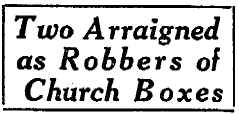
Their Mothers Must Be Proud


July 14, 1927
Los Angeles
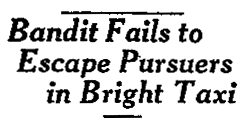
 Clifford J. Morgan needed some dough—hey, don’t we all—and what surer way to procure some than to stick up a gas station? So he hailed a dimbox and told the hack to take him off to the filling station at Jefferson and Figueroa. There the would-be highwayman told the taxi to sit tight, strolled into the oilpit, stuck a gun in the ribs of one C. F. Williams, relieved him of $45 ($537 USD2005), sauntered back to his waiting hansom, and motored away. Unfortunately for Williams, do-gooders Ralph Paine and W. Burke were in the station at the time, and, grabbing Officer Best along the way, found Williams’ taxicab quite conspicuous in its lines and coloring and was thus followed easily. At 51st and Central the trio caught up to and apprehended our hapless and callow highwayman.
Clifford J. Morgan needed some dough—hey, don’t we all—and what surer way to procure some than to stick up a gas station? So he hailed a dimbox and told the hack to take him off to the filling station at Jefferson and Figueroa. There the would-be highwayman told the taxi to sit tight, strolled into the oilpit, stuck a gun in the ribs of one C. F. Williams, relieved him of $45 ($537 USD2005), sauntered back to his waiting hansom, and motored away. Unfortunately for Williams, do-gooders Ralph Paine and W. Burke were in the station at the time, and, grabbing Officer Best along the way, found Williams’ taxicab quite conspicuous in its lines and coloring and was thus followed easily. At 51st and Central the trio caught up to and apprehended our hapless and callow highwayman.

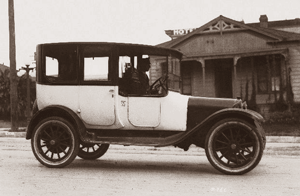 Vehicles-for-hire made the news again today in the strange case of five year-old Kenneth Stubbs, who had been placed by his mother Della in the home of Mrs. Bertha Whitiker at 3040 South Hoover. Mrs. Whitiker reported that a man called at the house, purporting to represent a local orphanage in which the boy’s mother wished to place him. After a brief conversation, the man departed. Two hours later, another man arrived in a taxicab. Mrs. Whitiker saw the little Stubbs boy invite the man into the apartment before witnessing said man scurry away with the boy in his arms, and the taxi speed away. (Estranged husband John Stubbs, up in Vancouver, is said not to know of Della’s whereabouts and therefore could not be part of this misuse of our public transport.) No further mention of the Stubbs kidnapping, or of little Kenneth Stubbs, is ever made in the Times.
Vehicles-for-hire made the news again today in the strange case of five year-old Kenneth Stubbs, who had been placed by his mother Della in the home of Mrs. Bertha Whitiker at 3040 South Hoover. Mrs. Whitiker reported that a man called at the house, purporting to represent a local orphanage in which the boy’s mother wished to place him. After a brief conversation, the man departed. Two hours later, another man arrived in a taxicab. Mrs. Whitiker saw the little Stubbs boy invite the man into the apartment before witnessing said man scurry away with the boy in his arms, and the taxi speed away. (Estranged husband John Stubbs, up in Vancouver, is said not to know of Della’s whereabouts and therefore could not be part of this misuse of our public transport.) No further mention of the Stubbs kidnapping, or of little Kenneth Stubbs, is ever made in the Times.
July 5, 1927
Venice
It was April 12, 1924, south of the border down Mehico way, when two brigands confronted Fedosis Alvarado on his ranch near Monte Escobeda, stole $2400 and shot him dead when he tried to defend his property. Arrested for the crime, Santiago Figueroa used the victim’s money to avoid prison time.
Fedosis’ daughter, Maria Alvarado Gomez, was not satified with the verdict, and when she heard her father’s killer had moved to the beach at Los Angeles, she followed, taking a home at 1508 Pennsylvania Avenue, Santa Monica. She haunted the public spaces along the shore, not in a spirit of seaside pleasure seeking, but in single-minded pursuit of the man whose face was burned into her brain.
Last night, as crowds packed the streets of Venice for Fourth of July revelry, she finally saw him and cried out to her friends, "There he is, the murderer of my father, hold him, don’t let him get away!" But in Spanish, because, you know, everyone involved spoke Spanish.
Traffic Officer Carter happened on the scene and took the players into custody, calling in auto camp manager Howard Wesson to translate. Once the story was explained, an envoy was dispatched to the Mexican Consulate, to determine if Figueroa was wanted in his homeland.
Obviously not, since there was no follow up story on the incident. Poor Maria. Should there be a next time, may we suggest she be prepared to exact her own swift justice on her prey, and not make the mistake of trusting law or nations to supply a daughter’s long overdue justice.

The defendants pleaded not guilty, and to explain the presence of the chicken-in-question, one testified: “The chicken was hopping along the road with its head off and jumped into our car.” The others corroborated his statement.
The judge thought it was a good story, but not quite good enough to keep the trio out of jail for ten days.
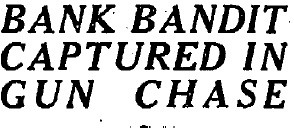
June 11, 1927
Hollywood
A man entered the Hollywood branch of the California Bank at 3900 Sunset Blvd. early this morning to make a withdrawal – at gunpoint. Brandishing a revolver, the robber forced bank manager P.A. Beaton, assistant manager C.R. Gray, and Deputy United States Marshal Dave Reynolds into a back room, locked them in, and then stuffed a sack with $4000 ($47,514.02 USD 2007) in cash.
At the same time the bandit was hurriedly jamming money into a bag, Marshal M.A. Duarte was waiting outside wondering what was keeping his fellow U.S. Marshal from their meeting. Much to Duarte’s shock, a few moments later he encountered a man exiting the bank clutching a bulging sack of money in one hand and a revolver in the other.
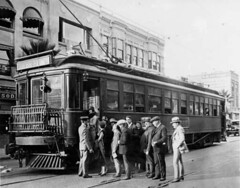
For a split second their eyes locked – and then the thief saw Marshal Duarte reach into his pocket. He quickly realized Duarte’s intent and fled down the street with the marshal in hot pursuit. Midway down the block Duarte began to tire. Huffing and puffing, he sputtered to a stop and fired two shots. At the crack of the first shot the bandit flung his booty to the ground. When the second shot whizzed past his head he threw down his gun. Duarte fired a third shot just as the fleeing felon was about to board a streetcar and escape. This time the man raised his hands to surrender.
The suspect gave his name as Gus Palovack aka F.J. Palivas, of 1017 Monterey Road.
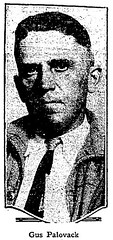 One of the most perplexing aspects of the case, other than why he chose a streetcar as his means of escape, is what drove Gus to bank robbery. Known about town as a realtor with political connections, Gus owns property and has several accounts in a number of downtown banks.
One of the most perplexing aspects of the case, other than why he chose a streetcar as his means of escape, is what drove Gus to bank robbery. Known about town as a realtor with political connections, Gus owns property and has several accounts in a number of downtown banks.
Hard work and a knack for saving money may be the reasons for the bank accounts and real estate holdings – but police don’t think so. They believe that Gus has recently made similar withdrawals from other local banks. Gus is charged with the robbery of the California Bank, and two robberies of the same branch of the Commercial National Bank located at 1572 Sunset Blvd. Bail is set at $25,000 ($296,962.64 USD 2007).
Gus either abandoned his brief career as a bank robber or became more adept at it, because there are no further mentions of his exploits in the Los Angeles Times after June 1927.
May 22, 1927
Los Angeles
Sometimes a guy just can’t catch a break: ask three ruffians who had little to show after today’s “reign of terror” except black eyes and bruises.
Stealing a flivver was the easy part. The trouble began when they tried to hold up a disabled man, William Gehem, at the intersection of Sunset Boulevard and Benton Way. Unimpressed by the large revolvers aimed at his person, Gehem smacked one of them out of his assailant’s hand with his crutch. In retaliation, the bandits knocked him down and robbed him of $12.
The trio next drew their guns on one Sol Feyer. Accosted on the Cornwall Street bridge in Hollenbeck Heights, the feisty Feyer grabbed one of the guns and threw it in the gutter. He then acquitted himself with his fists so well that the bandits jumped into their car and sped off—but not before Feyer, lying bruised in the street, reached up and removed their license plate.
Things went a little better at Rosemont Avenue and Larchmont Boulevard, where the hoodlums held up John Lentz without incident, making off with $100 in cash and jewelry.
But such luck couldn’t hold. Their next “victim,” Walter Swanson (attacked while walking at Pasadena Avenue and Avenue 63), beat two members of the gang with such gusto that police believe they were forced to abandon their nefarious activities for the night. Swanson estimated he battled with the beasts for ten minutes before losing consciousness and being dragged into a vacant lot, where he was stripped of $7 in cash and a $60 watch.
Acting on a telephone tip, police arrested the 19-year-old driver of the stolen getaway car at Pasadena Avenue and Piedmont Street. One can only assume he was relieved to see them.
May 15, 1927
Los Angeles
Nobody ever said making a living in the arts was easy, but G. Leavitt Browne got more than he bargained for shortly after noon today when two young men showed up at his vocal studio located on the sixth floor of the Majestic Theater Building, 845 S. Broadway.
Browne told police the youths had come in response to his newspaper advertisement. Indeed, the three discussed the possibility of taking vocal lessons with Browne. But when the voice teacher turned away for a moment, his would-be students revealed their true natures: one grabbed him by the arm and the other threatened to strike the flustered music man with a heavy candlestick if he offered any resistance.
The young Philistines made off with $2.00 in cash and a wristwatch worth $20.00. No word on whether Browne cancelled his newspaper ad.
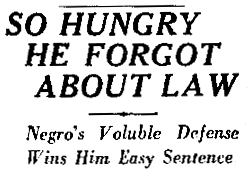 May 12, 1927
May 12, 1927
Los Angeles
Archie Quinzey appeared as his own defense today before Superior Judge Stephens, on the charge of unlawfully entering a local home, proceeding to the cupboard, and gorging himself on the comestibles therein.
Normally, it is said, he who is his own lawyer has a fool for a client, but such was not the case with Mr. Quinzey. Stephens heard and considered Quinzey’s plea, glanced out the window at a restaurant, considered and cogitated a spell, and stated that while he could impose a heavier sentence, he would not, and felt that a mere six months in County would teach Quinzey to ignore the savory odors emanating from other persons’ kitchens.
Quinzey’s plea, a mixture of erudition and ignoratio elenchi, is printed in the Times with all the characteristic argot endemic to the Good Olde Days:
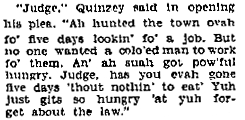
May 3, 1927
Pomona
Some call it extortion; we call it a rather clever short con. C.L. Jackson and R.W. Hedgreth, both 48 and old enough to know better, approached service station operators Harold K. Hemmingway and Norman Bliss in the guise of being Prohibition officers, and asked where ’round here one could wet one’s whistle. After being informed of the details, Jackson and Hedgreth threatened to alert the real Prohibition men of the illegal info being spread, and demanded a pair of tires, gasoline and $25 cash to keep quiet. But Hemmingway noted the serial numbers on the bills and called the law, and the crooks were soon nabbed.
Justice U.E. White must not have thought much of the victims in the case, for he sentenced the men to six months in County Jail, which he promptly suspended for good behavior.
Meanwhile, in Reno, Nevada’s first short residency divorce was granted to Sophia M. Ross of New York, who braved the desert winds and cultural drought for three months so she could be freed of her Albert, who ate mashed potatoes with his hands.
May 1, 1927
Los Angeles
In the Times today, a round-up of street crime incidents calculated to terrorize city residents, or at least discourage freelance musicians, good Samaritans and lingering outside a lady’s home in an open car–sheesh, buddy, get a room.
Clarinetist Antonio Cili thought he was being hired to play a gig when three gentlemen picked him up at Sixth and Broadway, drove to Fourth and Pecan, tossed him from the car, beat him silly and stole his instrument and $20.
Jennie Emerson of 2611 Vallejo Street was nearly run down in the street while crossing at Daly and Manitou in Lincoln Heights, and while recovering her wits confronted by the armed driver and his pal, who threatened to kill her before stealing her purse.
A bandit robbed J. Maganuma of $40 cash and a serving of chop suey at his restaurant at 4911 South Broadway. It was not reported if Mr. Maganuma spat in the food, but we certainly hope so.
A. Eisner was carjacked at First and New Hampshire, forced to drive to Sixth and Lucas and relieved of his $100 stick pin, $40 watch and $8 cash. Maybe it’s Eisner’s home address of 5579 Santa Monica Boulevard or the fancy stick pin that gives this brief tale the whiff of rough trade, or possibly we just have dirty minds.
Joseph Michael, while strolling by a doorway near First and Main was lassoed by a couple of rope-wielding miscreants who strangled Michael into unconsciousness and stole $35, this just two blocks from Central Police HQ.
Kindly Arthur Roper was driving along (now defunct) California Street near Figueroa when he spied a fashionably garbed young lady in apparent distress in the middle of the road. He stopped to lend aid and her friend hopped onto Roper’s running board with a revolver, which was clapped to Roper’s chest while the gal riffled his pockets of $53 cash.
And then there was Jacob L. Johannes of 228 South Rodeo Drive, who was sitting in a car with Miss Marie Boucher outside her home at 5806 Carlton Way when a fiend with a revolver relieved the lady of a $1000 fur coat, $75 watch and $50 bar pin. Johannes lost $6 cash. Buddy, you can’t afford a room… or Miss Boucher.
Now be careful out there!